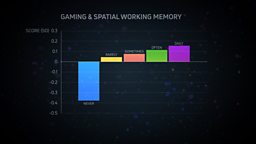Boost your brainpower in lockdown
By Michael Mosley
With the nation staying at home, and with more time on our hands, now’s your chance to flex your brain muscles. The Great British Intelligence Test has been challenging the nation’s mental abilities – over quarter of a million of you have done it so far – and it is still available for you to give it a go (find it on Imperial College London's site).
In addition we have some top tips to help you boost your brainpower.
Find out the full programme in The Great British Intelligence Test at 9pm on 主播大秀 Two, Monday 4th May 2020, but get a head start now with our quick hit advice below. And if you want to play along and see how your brain measures up to the rest of the nation’s, take a selection of the tests . Good luck!

How to improve your memory and find your keys
Your working memory is a critical skill which underpins almost all areas of your intelligence. When we looked at spatial working memory - your ability to remember where things are (like car keys!) - we found there were some surprisingly ways to help boost it.
1. PLAY COMPUTER GAMES – We discovered that those who played computer games more often, scored higher in tests of spatial working memory. In fact the effect of computer games was far greater than the effect of brain training. What is the best type to play? Apparently shoot-em-up high action video games have been shown to have the biggest impact on your spatial abilities.
2. STAY YOUNG – By far the biggest impact on working memory and your spatial abilities is your age. Our tests showed that your abilities peak in your early 20s and show a steady decline after then. But there are things you can do to slow this down…
3. EXERCISE – Studies have shown that a few months of aerobic exercise can increase the size of a part of your brain called the hippocampus – which is critical for working memory and spatial abilities. And research at the University of South Wales suggests that might be because exercise increases levels of a hormone called Brain-Derived Neurotropic Factor, which supports the growth of new brain cells and connections.

How to become a whizz with words
Our study of the British public showed that verbal intelligence is really influenced by lifestyle, so here are our top tips to boost your linguistic dexterity:
1. READ - I love books so I was delighted to see that the best way to boost your verbal abilities is to read. Those who read more books had higher scores of verbal intelligence – and the more they read, the higher they scored.
2. SEARCH THE WEB - Interestingly internet searching has almost as big an effect on verbal ability as reading! Those who spent more time searching the web, scored higher in our tests.
3. EAT YOUR GREENS – The Great British Intelligence Test also revealed that it was people who ate more fruit and veg who scored best in verbal tests. Whether this is because fruit and veg make you clever, or clever people eat more fruit and veg, it’s hard to say. I like to think it's the former.
4. GET OLDER - The biggest way to improve your verbal abilities is to do something which comes naturally to all of us: get older. Whereas other cognitive skills declined with age, verbal ability increased dramatically - peaking in those in their 70s and 80s. This is a fascinating new finding as previous studies have found that verbal abilities tend to peak in our 50s and 60s, and then start declining. As someone who is currently 63, I find this very encouraging!
5. OWN A CAT – Our study found that cat owners had slightly better verbal abilities than dog owners. The differences weren’t statistically significant, so it’s likely to be just a fluke (my dog will be relieved to hear that I am not going to be trading her in for something more feline).

Is our increased tech use under lockdown helping or harming our brains?
We are using our digital devices more than ever and we wanted to find out if increased screen use had any impact on either our intelligence or our mental health. The test was done in January, before lockdown, and it involved asking people about their techy tendencies – what devices people use, what they use them for, and how often. We also asked about frequency of internet-searching, social media use, online gambling, online shopping etc and compared this with different aspects of intelligence and mental health.
To our scientists' surprise, we found little relationship between brain power and the type of technology used or time spent. Except in one area…
There was a strong link between those who used the internet a lot, and those who felt anxious and stressed. If you showed signs of ‘tech addiction’ – e.g. checking social media after you were supposed to be asleep – then you were far more likely to also show signs of mental health issues. Both the addictive behaviour and scores for depression and anxiety were highest in teenagers, and those in their 20s.

If you’d like some information and advice about supporting your mental health, you can check out these resources from the 主播大秀’s Action Line.
Devised with scientists at Imperial College, London, the is the biggest scientific experiment of its kind, with over 250 000 taking part so far.

